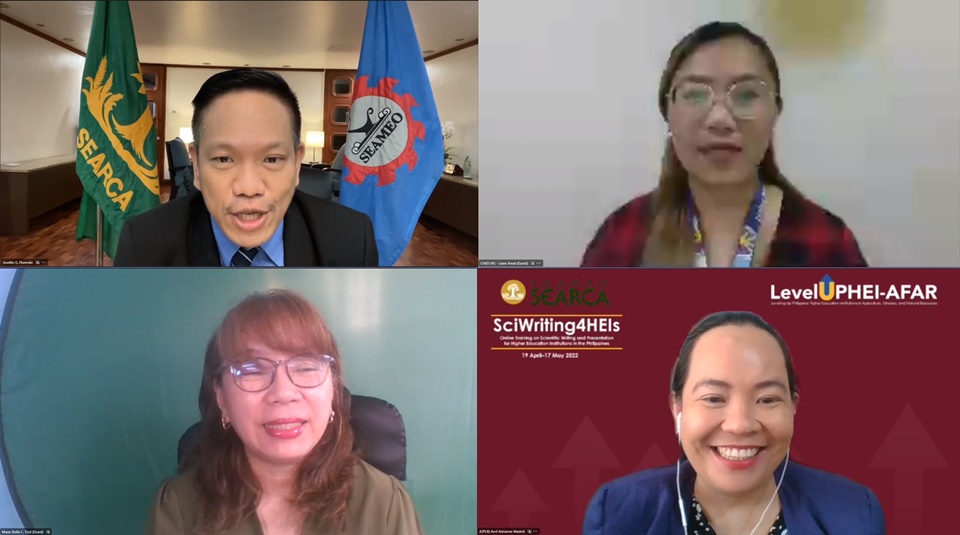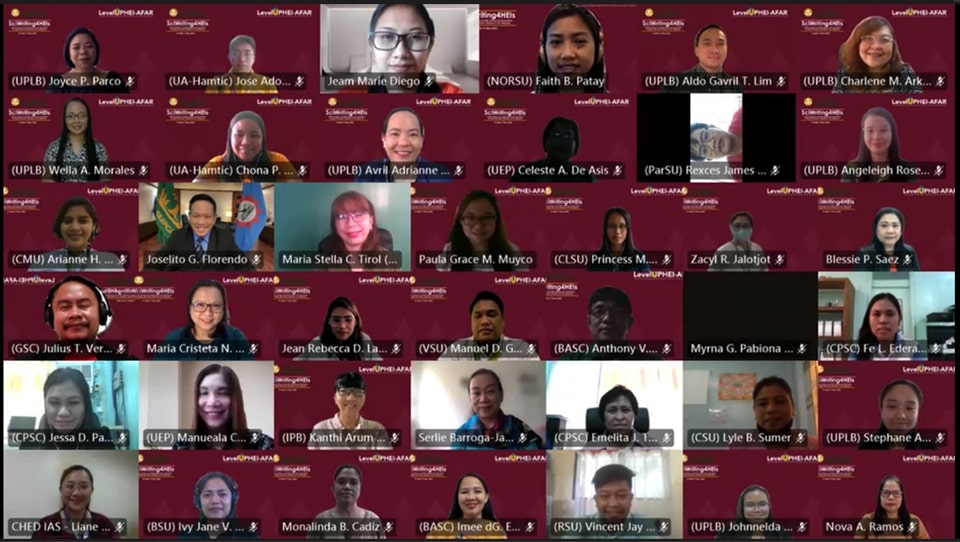In continuing to capacitate Philippine higher education institutions (HEIs) in the agriculture, fisheries, and natural resources (AFNR), the Southeast Asian Regional Center for Graduate Study and Research in Agriculture (SEARCA), with the College of Development Communication of the University of the Philippines Los Baños (UPLB-CDC), commenced the Online Training on Scientific Writing and Presentation for HEIs in the Philippines (SciWriting4HEIs) on 19 April 2022 via the SEARCA Online Learning and Virtual Engagements (SOLVE) Platform.
The training program is the fifth offering under the Leveling Up Philippine Higher Education Institutions in Agriculture, Fisheries, and Natural Resources (LevelUPHEI AFAR), funded by the Philippine Commission on Higher Education (CHED). It aims to improve the scholarly communication competencies of participants by deepening their knowledge of the foundations of scientific writing and publishing. The thirty-three (33) learners from the State Universities and Colleges-Association of Colleges of Agriculture in the Philippines, Inc. (SUC-ACAP) are higher education leaders, junior faculty and members, and researchers tasked to strengthen the research quality of their institutions.
 Clockwise: SEARCA Deputy Director Joselito G. Florendo, Ms. Maika Ela Aviso-Baguio of CHED-IAS, UPLB-CDC Dean Ma. Stella C. Tirol, and aProf. Avril Adrianne DG. Madrid.
Clockwise: SEARCA Deputy Director Joselito G. Florendo, Ms. Maika Ela Aviso-Baguio of CHED-IAS, UPLB-CDC Dean Ma. Stella C. Tirol, and aProf. Avril Adrianne DG. Madrid.
Prof. Joselito G. Florendo, SEARCA Deputy Director for Administration, formally opened the program. He expressed his gratitude to the institutions for implementing the training even during the pandemic and emphasized that it is “not just for the benefit of our respective institutions, but more importantly for the stakeholders whom we serve.” He also commended the learners for their participation despite the heavy workload and hoped that they would cascade the knowledge gained to their respective HEIs and students.
The partners also welcomed the attendees. Ms. Maika Ela Aviso-Baguio, Team Leader of the Scholarships for Graduate Studies-Abroad and International Relations of the CHED International Affairs Staff (IAS), delivered a message on behalf of Atty. Lily Freida M. Milla, Director IV of the CHED-IAS. Learners were reminded of their roles for the future of their institutions, Philippine higher education, and, ultimately, the country’s governance.
Meanwhile, Dr. Ma. Stella C. Tirol, Dean of UPLB-CDC, stressed the relevance of communicating research results to others through honing scientific writing and publishing skills, which is the course's aim. “Remember that the training becomes more meaningful when it is applied and practiced. Hoping to hear the good news later on that you have published your research article and that you have presented your video in a scientific conference,” Dr. Tirol said.
To present the training overview, aProf. Avril Adrianne DG. Madrid, Assistant Professor at the Department of Science Communication of UPLB-CDC and the Training Technical Coordinator and Lead Faculty, briefly discussed the training design. The approaches include seven lecture sessions, one special session, five learning application workshops, a mini-conference, individual coaching, peer review of learner’s outputs, and a presentation of key learnings. These are dispersed over two months until 17 May 2022 and learners are expected to have a publication-ready article and a video presentation for a conference.
Following the overview, Dr. Nova A. Ramos, Unit Head of Training for Development of SEARCA, introduced the participants, resource persons, and the training management team.
Two sessions and a special session proceeded after the opening program. Dr. Pamela A. Custodio, Associate Professor at the Department of Development Journalism of UPLB-CDC, led the topic on Introduction to Scientific Communication and the Peer-Reviewed Process. She discussed the basics of academic publishing and encouraged learners to push through even after a journal rejection. “Revise or look for another journal, don’t give up. Or maybe the research is weak; you have to accept that. It means you have to make something better next time. That’s how science works,” she said.
Learners also had the opportunity to meet the managing editors of scientific journals in the special session. The speakers were Dr. Mohammad Jawaid, Chief Executive Editor of the Pertanika Journals of Universiti Putra Malaysia (UPM); Ms. Monalinda B. Cadiz, Co-Managing Editor of the Asian Journal of Agriculture and Development (AJAD) of SEARCA; and Dr. Kanthi Arum Widayati, Managing Editor of the HAYATI Journal of Biosciences of the Institute Pertanian Bogor (IPB), Indonesia. During the open forum, the editors gave tips on minimizing desk rejection. Journal acceptance or rejection depends on novelty, originality, and clarity of writing.
Dr. Elaine DC. Llarena, Assistant Professor at the Department of Science Communication of UPLB-CDC, delivered the last session of the day on Planning the Publication of the Scientific Paper. Learners were coached on selecting a journal and developing a writing plan.
The next session within the week was on Techniques in Writing Scientific Articles with Dr. Serlie B. Jamias, Professor at the Department of Development Journalism of UPLB-CDC, as the resource speaker. From Dr. Jamias’ lecture, a workshop on writing a journal article took off with aProf. Madrid as the facilitator.
 Attendees of Day 1 and Opening Program of SciWriting4HEIs.
Attendees of Day 1 and Opening Program of SciWriting4HEIs.
The training program will run until 17 May 2022. SEARCA’s Education and Collective Learning Department-Training for Development Unit (ECLD-T4DU) is the organizer and coordinator of the online training, with assistance from the Management Information Systems Unit (MISU).